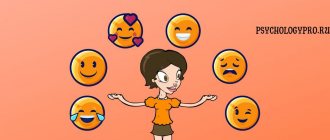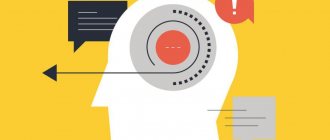Emotions accompany a person every second of his life. Sometimes they turn out to be pleasant and serve a supportive function, and sometimes they completely take over the entire thought process, making it impossible to adequately perceive reality. And in each individual case we are talking about the interaction of emotions and intellect. However, there is also such a thing as “emotional intelligence”.
Intelligence is a person’s ability to think, solve problems, process information and use new experiences for self-development. While emotions are responsible for changes in mood that are caused by external factors and stimuli. For example, bad news causes irritation and anxiety in a person, and upcoming good events invariably cause excitement. All these are factors to which the human body adapts.
A person can not be led by emotions and use them for his own benefit thanks to emotional intelligence. This term (from the English emotional intelligence) means a person’s skill in which he is aware of emotions, can manage them and even read them from himself to everyone who is part of his daily environment.
Emotional intelligence as a concept
The concept of emotional intelligence was introduced in the late 90s by US psychologist Daniel Goleman. But even before the official recognition of this term, there was also the term “social intelligence”, which meant the ability of people to adapt to their environment and calmly perceive their interlocutors, being able to hide some emotions and see what the mood of others is.
Research conducted by Goleman has shown that people who have developed emotional intelligence have good mental health, have leadership skills and are highly effective workers. At the same time, emotional intelligence is responsible for leadership skills. In professions that are directly related to stress, the ability to cope with one’s own emotions and high emotional intelligence are sometimes valued above any other knowledge.
“Change your attention and you change your emotions. Change your emotions and your attention will change.”
Frederick Dodson
Concept and history of the term
Emotional Quotient or EQ is the ability to express and manage your emotions, as well as understand the emotions, feelings, intentions and desires of other people.
At the turn of the XIX-XX centuries. The attention of researchers was focused on human mental abilities. Tests have been developed that measure the level of intelligence and express it in the form of a quantitative indicator. This is how the concept of IQ appeared. At that time it was believed that it was this that determined success in life.
In practice, it turned out that people with a high IQ did not always become successful, and those whose intelligence scores were average often built a dizzying career, had many friends and created a successful personal life. Later, researchers came to the conclusion that success is largely determined by another type of intelligence - emotional.
Charles Darwin spoke about the importance of emotions. In 1872, he published “The Expression of the Emotions in Men and Animals,” in which he described the role of emotional expression in adaptation and survival. The definition of Emotional Quotient was first used by Michael Beldock. In 1964 it appeared in his paper “Sensitivity to Emotional Expression in Three Forms of Communication.”
The heyday of EQ theory in America and Europe occurred in the late 1980s and early 1990s. Many studies have been devoted to this, and the first tests have been developed to assess the level of emotional intelligence.
For reference! You can read about what intelligence is in another article on our blog.
What does emotional intelligence mean in psychology?
Today, thousands of experts consider emotional intelligence as one of the most powerful human abilities. It can be easily corrected and developed, even if initially poorly developed.
Throughout the psychological research of the 20th century, several theories about emotional intelligence have appeared. The creators, leading psychologists in the world, described the main factors that are responsible for the symbiosis of intelligence and emotional state.
Goleman's model of emotional intelligence
Daniel Goleman divides emotional intelligence into 4 components:
- Self-awareness. This is a skill that allows you to analyze human emotions and intuition. This is an awareness of which aspects of the personality are considered strong, and where the limit of possibilities is. In addition, self-awareness is characterized by a feeling for oneself and a real appreciation of one’s talents.
- Self-control. This component of emotional intelligence includes the ability to take control of destructive emotions and impulses. People with self-control are able to quickly adapt to any situation, know how to seize opportunities, have reliability and honesty, and the ability to positively assess current events.
- Social sensitivity. This component manifests itself in a special talent - to hear the feelings of others, to take their place and take part in their lives and help them. For people who are in leadership positions, sensitivity is also manifested in understanding the hierarchy in the team and the ability to satisfy the requirements of customers or subordinates
- Relationship management. This component of emotional intelligence is characterized by a trait in which a person motivates others and can force anyone to follow him. Such people have the gift of persuasion, the ability to quickly resolve disagreements in a team, maintain social connections and create teams of like-minded people.
Read more: Attention - properties and features
Goleman's model shows how important it is to encourage a person to develop his personal qualities, which subsequently contribute to achieving success in many areas.
Emotional intelligence in the Mayer-Salovey-Caruso model
US specialists Mayer and Salovey Caruso have developed their own model of emotional intelligence. Work on it has been going on for many years. But the result was a new theory that includes four components.
- Emotion assessment and perception. The authors of the concept believe that this is the essence of the development of emotional intelligence, which lies in the ability to distinguish between emotions and understand their content. To confirm their theory, psychologists gave an example of the expression of sadness or happiness on the faces of other people. These expressions are the same for all people, which means they can be recognized. Children's emotions are easy to read because they have not yet learned to hide them. Adults try to hide all emotional manifestations, but microexpressions can still give them away.
- Using emotions for self-efficacy. According to psychologists, this component consists of recognizing the power of emotions and using them to your advantage. A person learns to maintain concentration on his main tasks. With a positive attitude towards them, a person begins to work more effectively. Even a person's brain becomes more active if a person has a positive attitude.
- Understanding the emotional background. This is a person’s ability to see the cause and source of a particular emotion, to realize the difference between thoughts and emotional impulses and emotions. According to the authors of the concept, it is important for a person to learn to perceive any emotion as a data carrier. If a person is constrained by fear, he can choose how to react to it - attack, freeze with fear, or run away from it. Some emotions can be transformed. A person can also notice how to change the sensory mood with the power of thought
- Emotional background assessment. It consists in the fact that a person uses emotions as steps to achieve personal results. But in order to begin to control the emotional mood, both your own and that of other people, you need to be in a constant state of awareness; it will allow you to remain calm and observant.
In psychology, emotional intelligence is considered along with another concept that studies the relationship between the mind and emotions. It is called the emotionality coefficient, or emotional quotinent. It was introduced by psychologist and journalist Ruven Bar-On.
The scientist presented a whole structure, which consists of a symbiosis of features. All of them together become the determining factor in how a person will behave in the future. Bar-On took IQ as an example and designated the emotionality factor with the letters EQ.
The Ruven Bar-On model includes several main components:
- self-knowledge;
- people interaction skills;
- the ability to adapt to different circumstances;
- the ability to easily get out of stressful situations;
- ability to control mood.
What is the difference between IQ and EQ
IQ is a general measure of an individual's logical, thinking, intellectual and analytical abilities. This includes verbal, three-dimensional, mathematical, logical, visual skills, the ability to develop new knowledge based on what is gained in the process of thinking and practical activity, analysis and comparison. Thanks to IQ, people are able to determine the processes occurring around them, learn, evaluate events and phenomena, focus on something, accept information coming from the outside world with understanding, whatever it may be, and solve upcoming problems using already acquired skills and knowledge and experience.
Everyone knows that an increased IQ level does not always have a positive effect on one’s career, personal life and relationships with others. It all comes down to emotional intelligence. Its low level does not allow you to effectively interact with people, successfully recognize and understand their emotions, mentally manage people’s states, thus making your way to the top of your career ladder or personal life.
Emotional intelligence is the ability to perceive emotions, generate them in such a way that they contribute to thinking, understanding the emotions of the interlocutor and managing them for one’s own purposes. In short, it is the skill of verbally managing people based on their emotions.
Approximately this concept arose immediately after the First World War. Edward Thorndike described EQ as the ability to understand people, regardless of their age, gender, mood and social status, and to interact intelligently with them.
The very concept of emotional intelligence arose during the Cold War, and a decade later, a classification of EQ appeared in the work of Michael Beldock, which, in addition to levels, provided recommendations for increasing it.
IQ is the mental intelligence quotient, and EQ is the emotional intelligence quotient. Next, let’s look at what the level of emotional intelligence depends on and how to determine its indicator.
Why emotional intelligence is important
Self-control in a world where a person is constantly accompanied by stress is a very important property. But many people get stuck at a level where emotions take precedence over reason, depriving a person of the ability to reason sensibly. And if children can be taught from infancy the skills of understanding feelings and managing emotions, then developing the emotional intelligence of adults is a more labor-intensive process. And it is important to start with the separation of feelings and emotions.
Read more: What is laziness
| Emotions | Feelings |
| An emotion is a short-term impulse with which a person reacts to external stimuli. Minor troubles cause equally minor outbursts of emotions. They flare up like a match and instantly burn out, giving way to other emotions. | Feelings are a long-term and stable attitude towards a phenomenon or person. Feelings tend to establish a close emotional attachment to an object or phenomenon, which can last for quite a long time. |
| Emotions cannot always be understood. Sometimes a person cannot understand exactly what emotion he is feeling. Often this is a whole set of different shades of the same condition. | Feelings always have a clear awareness and description. A person always understands that friendship is friendship, happiness is happiness, and love is love. |
| Emotions are difficult to hide and control. An unexpected outburst of anger or fear is sure to be reflected on the face, even if the person does not want to show it. | Feelings arise in the depths of consciousness and exist there, invisible to others. A person can hide and control them. |
Development of social sensitivity
Focusing on identifying and understanding other people's emotions has a great impact on all areas of life.
Tips for increasing social interaction:
- Greeting people by name: This helps remove barriers to communication.
- Timeliness: Keep in mind that the path to social sensitivity through timeliness is through focusing on others rather than on your own personality.
- Watch your body language: develop it with the help of appropriate books.
- Using prepared questions: allows you to quickly get out of a situation of awkward silence. Use an abrupt change of topic.
- Move aside your internal dialogue: It’s difficult to perceive your own thoughts at the same time as those of others. Distinguish between these concepts.
- Live in the present: be present in the current moment.
- Study EI using films as an example: consider any film as a guide to emotional communication.
- Observe people: consider their habits, signals, mood.
- Put yourself in someone else's shoes: this allows you to look at communication from a different point of view.
Components of emotional intelligence
When starting to study your own emotional intelligence, it is worth remembering that it is divided into two types: intrapersonal and interpersonal intelligence.
Intrapersonal intelligence
Essentially, this is a series of characteristics by which one can determine how a person treats himself:
- Self-awareness is the search for one’s personal abilities, awareness of the strengths and weaknesses of personality that affect others.
- Self-regulation. It lies in the ability to manage your emotional states and be able to focus on them. In addition, this skill allows you to quickly cope with stress and find solutions to complex issues.
- Self-motivation. This is the ability to recharge internally to achieve goals and the ability to maintain strength, perseverance and a positive mood when achieving a goal.
- Self-reinforcement. It consists of a good perception of oneself under any circumstances. The ability to praise yourself, your own personality and come up with rewards for yourself, always keeping a positive attitude in life in your soul.
Interpersonal or intrapersonal intelligence
This is, in fact, a whole set of skills and various abilities that form a person’s relationship with others. Basic skills:
- Empathy. It lies in the ability to hear and understand the emotions of others, to understand the motives of actions and to empathize with them. Empathy allows you to suppress conflicts before they arise. This skill is not innate; it is taught from childhood. Mandatory conditions for its development are to perceive people as they are, while being able to imagine oneself in the role of another person, without dissolving in him and maintaining one’s own individuality.
- Social skills. They allow you to positively communicate with other people, regardless of their assessments, without succumbing to rumors and their attempts to change your own decision. Also, these skills allow a person to maintain a positive attitude towards himself and protect his own interests in a conflict situation.
Development of self-management skills
Taking responsibility for your own emotions provides control in difficult situations.
Ways to develop a skill:
- Proper breathing: lack or excess of oxygen has a bad effect on brain activity. Try to take measured inhalations and exhalations. Avoid increasing or decreasing your pace even in stressful situations. Harmonious breathing gives confidence and calmness in subsequent actions, allowing you to quickly collect your thoughts.
- List of emotions and their explanations: it should consist of two columns - a call to action from each feeling, a rational definition. In a difficult situation, to avoid panic, use this technique to put your thoughts in order. The list allows you to decide which aspect of your personality is worth using at a certain moment.
- Counting to ten: in difficult situations, use the technique of counting as you exhale. This allows me to stop and collect myself at the right moment.
- Publicly declaring goals: is the best motivator for action.
- Put off making decisions: carefully digest the information in your head. The saying fits perfectly here: the morning is wiser than the evening.
- A clear daily routine in which there is room for problem solving.
- Attend seminars and coaching on emotion management.
- Keep a positive attitude.
- Improved sleep quality.
- Know the value of communicating with any person.
- Use a psychological reboot during the day: yoga, meditation, and walks in the fresh air are suitable for this.
- Realize the possibility and imminence of change.
Levels of Emotional Intelligence
Each person’s level of emotional intelligence depends on the conditions of growing up, upbringing and family relationships. There can be no average values here. That is, intelligence can be either high or low. These levels are determined using the following characteristics.
A person with high emotional intelligence:
- is aware of his own emotions and can interpret them;
- knows how to behave in such a way that his emotions do not hurt others;
- strives to develop and develop inner peace;
- knows how to create a motivational mood.
Read more: Developing thinking
A person with low emotional intelligence:
- not confident in one's abilities;
- irritable and conflicted;
- does not know how to restrain emotions;
- strives to keep everyone and everything under control.
If characteristics from the second list predominate in a person’s life, this is a clear signal to begin developing oneself.
Levels and types
Emotional intelligence begins to develop from birth. A child can distinguish between a mother’s smile and tears, showing different feelings. The formation of emotional intelligence occurs in 4 levels:
- Expressing and recognizing emotions. First, a person begins to distinguish emotions on the faces of others - joy, pain, delight. Gradually, the individual learns to distinguish between different types of feelings and begins to understand how to recognize a fake or sincere smile.
- Assessing emotions. The individual begins to compare the emotions that other people show with previously acquired knowledge. This is how a person learns to draw relationships between individual feelings.
- Using feelings in reasoning. During this period, the individual begins to understand emotions from the inside. A person analyzes them, finds out where they come from, under what conditions. An understanding comes that a persistent expression of joy can hide inner pain, fear can hide behind anger, and anger arises against the backdrop of betrayal, deception, and injustice.
- The highest level of development of emotional intelligence. At this stage, the ability to control and manage feelings is formed. With the help of self-regulation, you can change the emotional state of other individuals. For example, such skills are useful in conflict situations, when you need to calm down an argumentative person, cool down his anger and aggression.
Psychologists say that the development of emotional intelligence is not determined by the process of growing up.
How to use emotional intelligence
High emotional intelligence allows a person to control the entire sensory and emotional component of life. In this way, a certain balance arises. It allows a person to achieve results in all areas of life, while maintaining a sense of stability, good relationships with others and a positive attitude.
Possessing emotional intelligence allows you to keep all events and circumstances in life under control. There is a simple way to check whether this level is high. People exhibiting high EQ exhibit:
- confidence;
- curiosity;
- awareness of intentions;
- self-control;
- creativity;
- the ability to maintain communication, improve connections with people, develop empathy and love for others.
With these skills, you can use emotions as a tool to build connections and improve your sense of self.
Emotional intelligence of a leader: how to develop and apply. Emotional Intelligence in Business
A person's leadership qualities directly depend on his emotional intelligence.
The manager must have:
- accurate perception and management of one’s own and others’ emotions;
- knowledge and understanding of the causes of experiences and impressions;
- using the emotional component to solve problems.
A manager’s emotional intelligence allows him to build long-term relationships, recruit and maintain a strong team, create a positive environment in the team, make clear decisions, and manage stressful situations.
The best and most successful leaders are those who fully possess the characteristics of high EI. This person knows emotions exactly, knows how to handle them and build a relationship with the thinking center.
The development of a leader’s EI is carried out both in general terms and in the leadership direction. Previously, increasing the level of EI for each person was discussed. In addition to these tips, the manager must also adhere to the following rules:
- Look at success in the long term.
- Inspire people.
- Persevere through all tests.
- Build only a strong team around yourself.
Using these skills allows you to improve the quality of interaction both within yourself and among the people around you.
You can read in more detail about the EI of a leader in the book of the same name by David Caruso and Peter Salovey.
Emotional Intelligence Training
If a person still finds it difficult to control emotions, and some skills leave much to be desired, then you can independently develop emotional intelligence. To do this, you need to divide self-study into several stages.
- Study of emotions. At the first stage, it is important to understand what emotions are, how they arise, how they develop, and how they can be used for your benefit.
- Understanding the location of emotions. This stage takes quite a lot of time, but allows a person to learn to listen to himself and his own body. It often gives clues as to what kind of emotion a person is experiencing. For example, fulfillment is reflected in the chest, and anger can cause a headache.
- Regulating emotions. At the third stage, you need to learn to manage your emotions. Constant training will help with this. Chief among them is observing yourself in different situations. It is important to remember your behavior and try to change it if it is destructive.
- Learning to interact with society. This stage is mainly about developing empathy. That is, the skills of empathy for others and their support.
Managing emotions effectively requires constant practice. Various methods of developing emotional intelligence and exercises will help with this.
- Working with the body. This method allows you to control your own emotions with the help of your body, unnoticed by others. For example, clench and unclench your fists, or stand on your tiptoes several times. When it is difficult to contain emotions, these methods will help to quietly cool down the ardor and maintain calm.
- List of problems. This technique involves making a list of all the troubles that have been bothering you lately. After completing the list, you need to start solving everything written. As you decide, emotions will gradually recede into the background, and a positive attitude towards life will become the main feeling.
- Emotional motivator. This practice is designed for those who do not get along well with others. It consists of compiling a list and further implementing various methods of maintaining the spirit of excitement and fun in the team. Even if a person was previously closed and complex, then for further development it is worth taking the first step and gradually starting to open up.
Olga Figura
Differences between men and women in overall EQ levels
The characteristics of emotional intelligence differ depending on gender , which has long been the subject of debate.
In general, men and women show similar levels of EQ. Women exhibit high abilities in relation to interpersonal emotions and social responsibility. Men are more prone to stress resistance and expression of adaptive functions.
The debate around emotional intelligence has been going on for decades. In any case, a person’s professional qualities are closely interconnected with his ability to find a common language with people around him and the ability to adapt to the most unexpected situations, which will be the subject of study by all psychologists for many years to come.
EQ level test: how to determine your emotional quotient
Last week we talked about the skills of children and adults to recognize and manage their emotions; we have outlined how much emotional intelligence prevails over mental intelligence in the modern world; revealed what it means and how it helps to socialize successfully. Today, in continuation of the topic of emotional intelligence, we offer several test options by which you can thoroughly familiarize yourself with this integral concept in our lives and try to determine your coefficient of emotional development.
IQ (intelligence quotient) is losing its position as the sole leader in determining success. It is replaced by EQ (emotional quotient). This does not mean at all that it becomes decisive. Not at all. A favorable combination of reason and emotion is important.
Emotions come first!
"If Dumb, Dumber" has a high emotional quotient, he would be a good comedian at best. And at worst - a banal neurasthenic. The brain of each of us is divided into two halves: logical (left hemisphere) and emotional (right hemisphere). All information received from the outside first passes through the emotional representation of our brain and only then enters its logical part. The norms accepted in society and the environment encourage us to hide our emotions in front of people and not show them. And, hidden deep inside, they don’t go away.
What your emotional status is depends on your emotional development. Emotional development, starting from childhood, does not stop in adulthood. It is indispensable in the ability to establish relationships with others and is very important in achieving success and finding happiness in your personal life. Of course, happiness and success have many components - this is both natural intelligence and a successful coincidence of circumstances. But the emotional quotient, like nothing else, helps to understand why some people who were not particularly successful at school and did not shine in college subsequently achieve great heights in their field of activity.
Emotions hidden deep inside do not go away. In children, unreacted emotions are transformed into fear and uncertainty. In adults, suppression of feelings and emotions leads to the release of adrenaline and norepinephrine, which, in turn, lead to various kinds of psychosomatic diseases, primarily hypertension (also called the disease of unexpressed emotions).
What's the secret
What is hidden behind this coefficient? This is, first of all, determination and perseverance, the ability to curb your desires in order to achieve a goal, control of your emotions and mood, the ability to sympathize with others and hope for the best. But for most people, the task of managing one's own emotions is quite difficult, primarily because our culture focuses primarily on the development of intelligence, and such human qualities as empathy, self-awareness and control over one's feelings are ignored. Therefore, everyone must take care of their own emotional development, learn to express emotions within the framework of accepted norms in society and try not to ram them unreacted into the hidden corners of the subconscious, so that they do not carry out their destructive work there.
Magnificent Eight
The true values and traits that are welcomed in society today are these eight qualities: friendliness, sincerity, empathy, intuition, gentleness, sympathy, mutual understanding, trust. All of these are also components of emotional intelligence. "Emotional competence" refers to the ability to recognize one's own feelings and the feelings of others, for the purpose of self-motivation, as well as for the purpose of managing one's internal emotions and emotions in relationships with other people. Emotional competence describes abilities that are distinct from intellectual IQ, but complement those purely cognitive abilities. Many people who are book smart but lack emotional intelligence end up being supervised by people who have lower IQs but excel in developing their emotional intelligence.
There are at least seven factors that determine the degree of emotional development:
- the ability to understand oneself;
- the ability to manage your emotions;
- determination;
- sincerity;
- truthfulness of feelings;
- the ability to sympathize;
- the ability to help people improve relationships with each other.
Of course, EQ diagnostics is not a panacea for all personal “troubles,” but prompt diagnosis of the coefficient of emotional development really allows an individual to avoid many disharmonious situations, both in current life activities and in the sociocommunicative sphere.
Your EQ Level
To determine your emotional quotient, we offer the following three test methods:
Test 1
Answer “yes” or “no” to the questions below:
- When people are busy with their own business, I do not turn to them for help, because I am sure that it is useless.
- Having learned that one of my old acquaintances came for a short while from another city, I, despite my workload, will find time and meet with him.
- As a rule, I determine whether a person is in a good or bad mood by one look.
- Reading crime columns in newspapers or watching television news can unsettle me for a long time.
- I am in a good mood more often than in a bad one.
- When talking with my superiors, I get lost and only think about how to end the conversation as soon as possible.
- I never knew how to skate, but I think if I wanted to, I would learn.
- I feel great with my friends.
- Before I take on any business, I first make a plan, think about where I will start.
- A car, TV, or refrigerator breakdown can make me feel confused and even desperate.
Sum up: if you answered positively to points 2, 3, 4, 5, 7, 8, 9, then you can be congratulated: your emotional development coefficient is quite high. If you answered positively to points 1, 6, 10, then this is somewhat sadder, and you should think about your emotional development, and maybe even reconsider your views on life.
Test 2
Choose answer A or B, whichever best suits your temperament. This will help you better understand how developed your emotional intelligence is.
1. You forgot to wish your work colleague a happy birthday.
A. I never remember birthdays at all.
B. I was busy with other things
2. The library demands money from you for a book that you did not return.
A. When I am engrossed in reading a book, I forget that I need to return it.
B. I was so engrossed in writing the report that I forgot to return the book on time.
3. You lose patience with one of your friends.
A. She always complains about life
B. She is aggressive
4. You feel exhausted
A. I never manage to find time to rest.
B. This week has been particularly busy.
5. One friend says something to you that hurts you.
A. She always speaks without thinking.
B. She was in a bad mood, that’s why she attacked me
6. You fall on the ski track
A. Skiing is generally difficult
B. The ski track was just slippery
7. You gained weight while on vacation and can’t seem to lose it.
A. Diets are of no use
B. The diet I tried is not effective.
Processing the results. The more A's you score, the lower your EQ and therefore the less likely you are to succeed. And, conversely, the more B, the higher the coefficient.
Test 3
Testing your parental emotional intelligence may be interesting. The “Character of the Child” questionnaire, intended for parents of older schoolchildren and developed by E.A., seems to be very interesting and quite simple in practical use. Berdichevskaya, teacher-researcher from municipal secondary school No. 409 in St. Petersburg.
QUESTIONNAIRE “CHARACTER OF A CHILD” (for parents of older schoolchildren)
- Is it easy to make your child laugh?
- Is he often capricious (disobedient)?
- Does he behave calmly at home, without driving everyone at home (including pets - cats, dogs and others) out of patience?
- Does he have friends with whom he willingly communicates and plays?
- Does your child often “lose his temper”?
- Do you always need to keep an eye on him?
- Does he have a habit of fantasizing a lot?
- Does he behave well with his peers, and does he need special supervision (control) on your part?
- Does your child have any minor fears (phobias)? (Tick which ones).
Decoding of questionnaire results. If you can give positive answers to questions 1, 3, 4, 8 and negative answers to questions 2, 5, 6, 7, 9, then you are raising your child well, and he is well adjusted to life.
In conclusion, emotional intelligence and its definition are complex. It is impossible to calculate it, since they are calculating the IQ for now. Emotional coefficient – assessment of trends, development prospects. In addition, EQ is a variable value, that is, it is not a fixed and unchanged value from the moment of birth. The correctness of emotional life and the release of emotions will serve well in the development of emotional intelligence.
Anna Savon, Rodina newspaper
Tags: developmenttestsemotionsemotional intelligence











